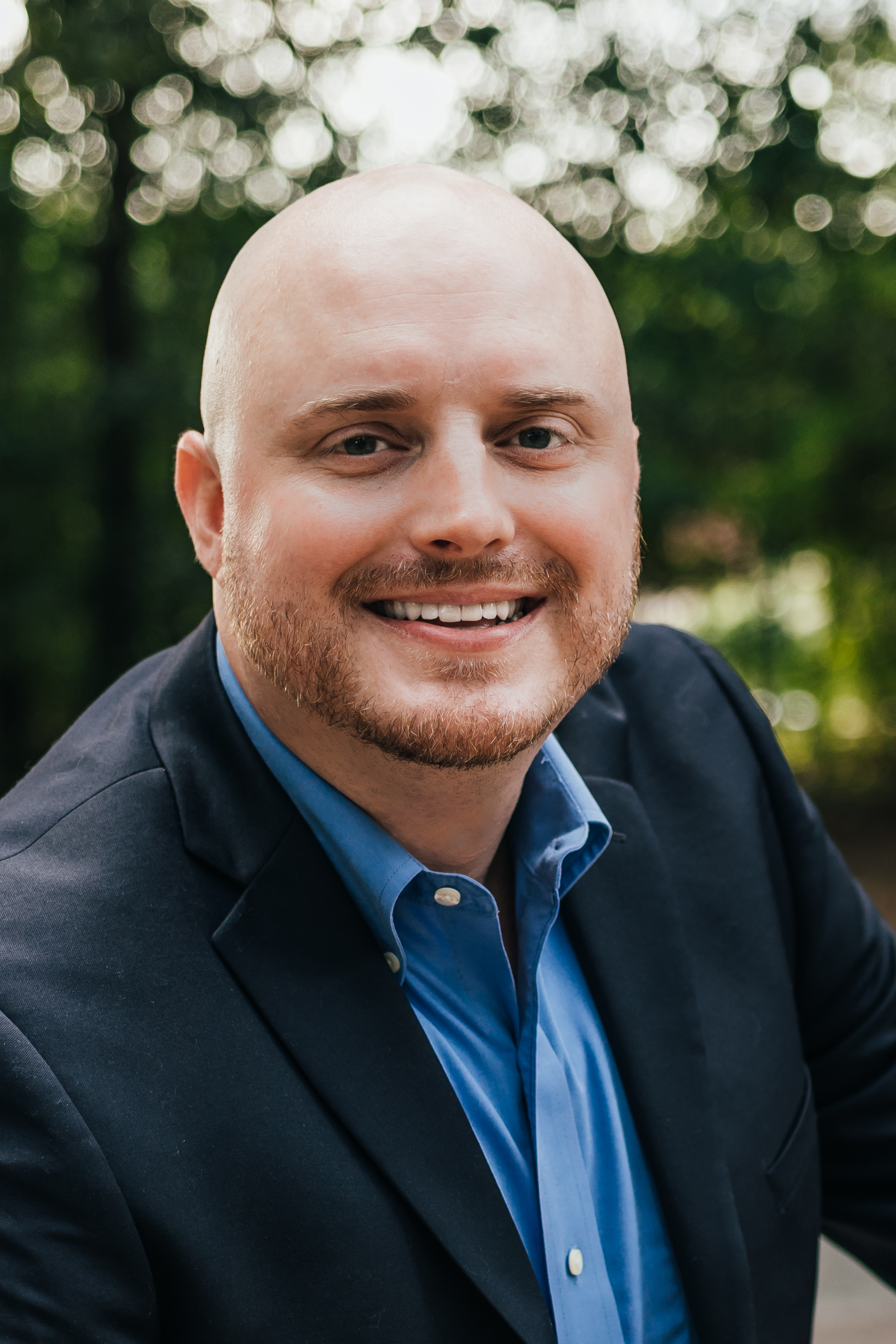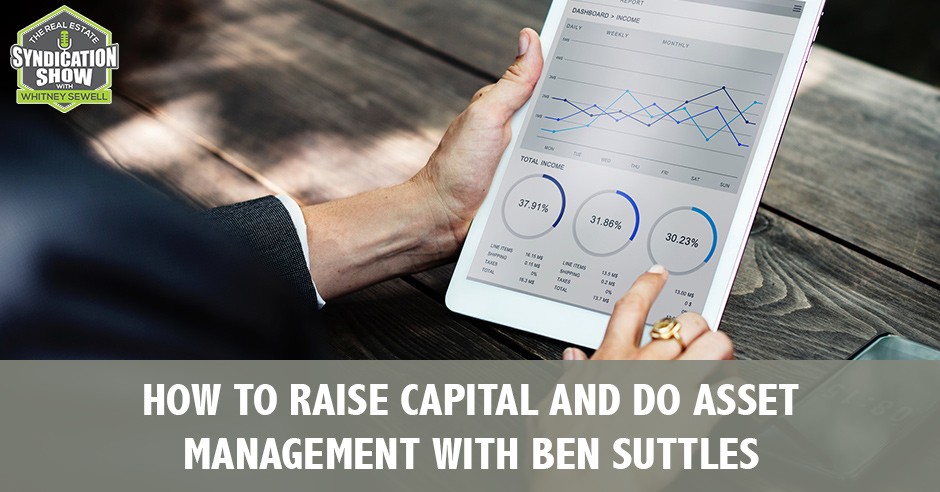Listen to the podcast here:
Everything starts from scratch. Even businesses and asset management start from nothing, but it only takes one person to materialize something into one great entity. Ben Suttles, the co-Founder of Disrupt Equity, shares his journey towards becoming a successful entrepreneur. He talks about his first deal, raising capital, managing a team, and the difficulties he experienced closing his first property. He reveals the catalyst for syndicating his first deal, and notes that giving back has been very beneficial despite the challenges he faced. Ben says there are always challenges when closing deals, and having higher level of self-confidence draws more clients towards you.
Our Gracious Sponsor:
Are you tired of answering emails from investors about when they’ll receive their K-1s?
Let The Real Estate CPA handle the accounting and taxes on your next syndication and they’ll file your tax returns by March 15th so you can get K-1s to your investors by the individual filing deadline on April 15th.
Not only will this reduce headaches, but it will help you retain investors over the long-term by improving investor experience.
The Real Estate CPA is now offering a Special Virtual Workshop to the listeners of The Real Estate Syndication Show on How to Answer Tax Related Questions from Your Investors!
Learn more today by visiting: http://bit.ly/Real_Estate_CPA
—
Watch the episode here:
How To Raise Capital And Do Asset Management with Ben Suttles
Our guest is Ben Suttles. Thanks for being on the show, Ben.
I appreciate it, Whitney. I look forward to adding some value to your audience here.
It’s been a pleasure to meet you at the mastermind. I knew you’d be a great guest on the show. You’ve got some great experiences to share from and increase your expertise in this business. I’m looking forward to it. Ben is an entrepreneur having owned half a dozen companies with revenues at $12 million per year. He’s helped syndicate eight multifamily projects over the last few years total in close to 1,300 doors and $70 million in assets under management. He sold his first syndication for over 365% return in less than two and a half years and has raised over $20 million in his career for various real estate projects. You’re going to tell the audience a little bit about yourself, but I want to get into that first deal with 365% return.
I come from the IT world. I always say that I wasn’t one of the smart guys. I was on the sales business development side so I was the guy sitting in the conference room telling people how much stuff costs. That was my background. I’ve had IT companies. That’s the world that I’ve come from. That entrepreneurial background and spirit have been able to segue into commercial real estate. It helped me on some of the things that we’re doing on the equity raise or the asset management side. I got into real estate in 2013 and got into multifamily at the end of 2014 and been blowing and going ever since.
Did you go straight from IT to real estates like single-family or wholesaling or something like that first?
[bctt tweet=”In order to manage people, you need to have the 40,000-foot view.” via=”no”]
Like a lot of people, you start off with single-family. I did do that. I did some wholesaling and I did some rentals. It wasn’t something that I was interested in. Not to say that you can’t make money in that, you can. I’ve seen a lot of people be successful at it, but it wasn’t for me. I was looking for something a little bit more scalable and a little bit more in line with that skill set that I came from. I’m driving all around Houston where I live. I’m trying to wholesale houses and it wasn’t what I wanted to do for the next twenty years. Structuring commercial real estate deals are more in line with my background and that gravitated to multifamily after hearing Lifestyles Unlimited, which is a group here in Texas. I heard them on the radio. From there, I started going out to events and networking events and that drew me into the multifamily space. I was sold at that point.
Before we dive into that first property, tell us how you went from that IT guy to multifamily to the person that’s thinking, “That’s the shoes I’m in. I’m really looking to get into real estate. How do I get there?” What are some steps you took to build your confidence, your education and eventually, syndicating that first deal?
The catalyst was my daughter when she was born. She was born in 2013. You’ve got nine months. What are we doing for nine months? You’re cleaning up the house and doing all these things. I’m also reading a lot. I’m listening to a lot of podcasts. Real estate was something that I was always interested in. Originally, it was more to supplement the income that I was making on the IT side and now it’s morphed into its own thing at this point. That was Robert Kiyosaki’s Rich Dad Poor Dad. It was a light bulb moment for me whenever I read that book. For a lot of people, it was one of those things like, “I need to get into real estate. This stuff makes sense to me.” The confidence was always there. I come from a sales business development background so getting in front of people, talking about things, selling things and that type of stuff, that was my forte. Going into networking events was what I was doing.
All of this was in a different industry. Once I had that idea that I want to get into real estate, it was which niche that I want to go. Going back to Robert Kiyosaki, he has a training program as well. I first gravitated to his training program and went through that whole thing. I spend way too much money doing that as we all have on mentoring and training and stuff. It pushed me to continue that path down real estate and to this day, I would consider him my first mentor. That’s the catalyst for me to get into the real estate world. There’s a lot of burning the candle at both ends, especially when you’re starting off. It’s a lot of long days, a lot of long nights and working on the weekends. You’ve got to have a passion for it. You’ve got to want it if you want to turn it into your next career or you want to turn it into even a side hustle. The side hustle is not going to build itself. You have to go out and do some stuff. You have to be prepared to juggle and wear many hats and make sure that your spouse is on board because you’re going to be doing a lot of traveling and a lot of networking events. You want her to be supportive of that as well.
I’m glad you brought that up. My spouse is part of my team. If she weren’t supportive of this, it wouldn’t work.

You need their support because that gives you that fire. Whatever that fire is within somebody that gives them that initiative out there and do that, that’s what you hold onto and say, “This is the reason why I’m up at 12:00 at night answering emails and underwriting deals because I want this to work. I want this to be successful.” I tell everybody that it’s possible to do two different careers. Some of us are doing it still. Most people start off like that, so it’s possible. Everybody that you look up to, everybody that you’ve seen that’s been successful, they started at zero. They started doing this at night and on the weekends. I always encourage people that if you’re passionate about it and you want to do it, go out and make it happen.
Paint a picture for us of that first property or the first syndication. Tell us a little bit about it. How did you find it? How did you make it work? Tell us some of the difficulties you experienced getting to the closing table for this first property.
There are many challenges. I was part of a mentoring group here in Texas. The mentoring groups do a good job on the frontend, how to underwrite deals. Some tips and tricks on how to raise equity, but they don’t get into the nitty-gritty details of how to close things and how to operate businesses. That’s probably where they’re lacking. I was originally going to go passive, which I was going to invest in other people’s deals. I had some money in my IRA and I was going to get my feet wet. There’s about a six-month low where I didn’t see much stuff hit my desk that I was interested in. I started getting anxious and wanting to do something. I started underwriting deals, which is analyzing deals that maybe were out there in the market and were on the market. I was underwriting them to see if they made sense. After doing that for a couple of months, I buddied up with a few people here in Houston and I started asking them, “How many any deals have you passed on?” There was one gentleman named Mike Hartage that I partnered up with and he had this one deal in Huntington Park.
Huntington Park is in Beaumont and it’s about 90 miles east of Houston off of I-10 here in the South. It’s a smaller community, but it’s mainly petrochemical driven with a good stable economy. I was like, “I’ll take a look at something in Beaumont.” I started underwriting the deal. After a little bit of tweaking the numbers and looking at things and validating numbers with my insurance broker and everything else, I realized that this was a pretty good deal. I went back to Mike, and I said, “The deal that you passed on that you thought was bad was good. You didn’t look at it for more than five minutes, so you passed on it.” I did the right thing. We ended up partnering up 50/50 on the deal. We ended up getting it under contract for exactly what they asked for because what they were asking for was a ten cap. Even for a few years ago, a ten cap from Texas was a good deal. We didn’t negotiate too much with them on the pricing. I got it under contract. Mike immediately goes out of the country for the next two months. He’s a very successful syndicator already. He was in Europe. It was during the summer.
I was like, “Mike, this is my first deal. I don’t know what I’m doing.” He would send me some emails with some tips and stuff, but he was not around. He came back and it was right before closing. He had a family reunion in Yellowstone. As anybody knows, when you’re doing closings, you have things that have to be notarized and things that have to be signed. This guy is in the middle of Yellowstone. The day before closing, I forced this guy to drive two hours I forgot to what city that has some kind FedEx Kinko’s that he can notarize and get things mailed and signed. We closed it but he didn’t help too much on that part of the process. I was out there raising the money on my own. The equity came from friends and family as well as people that I had met in networking. You have to put yourself out there. You have to tell people what you’re doing. They put a lot of trust in you, especially as a new syndicator. They’ve got to like the deal. They’ve got to like you to put the money because you don’t have that proven track record. I raised $800,000 on that deal. This was ‘92 so I bought it for $3 million. It was about $32,000 roughly a unit. It was a good price point.
[bctt tweet=”Everybody that you look up to who has been successful started at zero.” via=”no”]
My whole business model was to get their insurance from $100,000 down to $60,000. I bought it at such a good price point. It was all I needed to do. I didn’t even need pop rent. There wasn’t a heavy value add. There wasn’t any of that stuff going on. This thing ended up spitting off about 17% to 18% on cash-on-cash each year. Fast forward a couple of years, we did do some value add on it. I ended up getting it closed. We worked through all those challenges and closing and I raised the equity. We went through a little bit of a value-add rehab. There was nothing major. We did some roofs, replace some ACs and stuff like that and then Hurricane Harvey hit. This was in ‘17. I just finished up the value-add and a month later, the hurricane hit. Thirty-two units out of the 92 flooded and we had to terminate the leases. People had to vacate the units. We’ve got to take them down to the studs. Luckily, the property hasn’t spent all cash and we had set aside a lot of cash to be able to pay our bills, but we took it all the way down to about 60% occupied. We were at 99 before the hurricane.
Here’s your challenge. These don’t always go as planned. You can’t plan a hurricane. Luckily being along the coast, we had the foresight to have flood insurance. We had the flood insurance on the property and that allowed us to do a claim through FEMA. That’s working with the government, which is horrible as everybody probably can suspect. We went through the process, we got the inspectors out there. They were very generous. On that $8,000 flood insurance policy that I paid for, it paid out $2.1 million. I had already put some money into it prior to the hurricane and then we put another $2.1 million into it. You can imagine in 32 units, I didn’t need $2.1 million but we updated the office in the clubhouse. We replaced all the AC units. We updated all the laundromats. We completely repositioned this property. On that $3 million purchase price, I had $2.6 million worth of value-add rehab that I had done to it. Now, I’m sitting on a ton of equity.
In that same timeframe, I had taken the NOI from $300,000 a year to $500,000 a year. I’ve got a ton of equity. I’ve increased the NOI and at the same time, market cap rates have compressed. Even in that market, market cap rates were ten. They were eight but I sold it at a seven cap. I bought it for ten. All those things combined ended up selling the property. I bought it at 32 and I sold it at 76. That was one of those things that it was good timing, good area but it could’ve gone completely another way. That netted my investors who were out there on a hope and a prayer that I was going to be able to pull this thing off and it could have gone dicey after the hurricane. I ended up netting them 365% total return in two and a half years. That one ended up turning out well. I’m not saying all of them are going to be like that, but I feel pretty good about that one. Now, I’ve got lifelong investors because of that deal.
I wanted to back up just a little bit and I want to talk about the investors during the hurricane. On this first deal, you raised $800,000. I don’t see too many people unless you already have a very established high net-worth network from another business or from another job that can raise $800,000 on their first deal. What were a couple of challenges that you faced approaching people the first time on your first deal and selling them on this opportunity?
It boils down to, do you trust this syndicator? I always tell people that people aren’t investing in the deal. They’re investing in me. I had to build up that level of trust and rapport with people. On top of that, we co-invested too. Not all that $800,000 was from investors. We kicked in about $150,000. I still had to get about twelve to thirteen people to say yes to me. That was a lot of phone calls. That was a lot of lunches. That was a lot of dinners where I pitched out of the deal. I owned that deal. I knew everything about it. If they fired off a question, I knew the answer to it. That level of confidence gives people confidence in you. Especially on your first deal, you’ve got to know everything about it. You’ve got to own that deal. You’ve got to own that area. Why Beaumont? Why Huntington Park? Why you? What gives you the right to go out there and ask me for money? At the end of the day, you’re providing them an opportunity to invest in a great asset.

It doesn’t have to always be a pitch fest. Sometimes you can spin it, especially what I’m doing now. I’m spinning it like, “I’m doing you a favor by bringing you into these deals because they are very limited.” There are usually only 20 or 30 spots and sometimes more or sometimes less. It depends, but they’re very limited and you have to know the sponsor to get into these deals. At the end of the day, they’re very lucrative. I was giving them an opportunity to invest in a deal that was going to be right off the bat without me being aggressive at all on my underwriting. I was going to be spinning off 17% cash-on-cash. That in itself helped the fact that I had an experienced operator like Mike as my partner helped and the fact that I owned the deal. I knew that what I was talking about helped.
For your readers starting off, your first deal is very imperative that you know what you’re talking about because they’re going to see right through you if you’re trying to BS them anyway. Even if you don’t know an answer and you disrespectfully say, “I’ve got to find that out. That’s a great question. I’ll get right back to you on that.” Instead, some people try to spin it like they know what they’re talking about and people see right through that. You’ve got to be very genuine with people. You’ve got to be open, transparent and honest. Once people see that, that builds trust with people. That was how I was able to get through that first raise. The second one gets easier and then the third one gets a little bit easier after that because you’re starting to build up a track record. Now you have the resume that you can point too as well.
The hurricane hits and everybody is wondering about their investment or wondering about this property and what’s going to happen. What were the conversations like then? Were they ready to pull out or were they ready to stand beside you through this? What was that like?
Luckily in monthly financials, you’ll see the balance sheet and you saw the money in the bank. It was spinning off so much money, I could have paid 30% out each year but I was only paying 17%. The reason being is we were setting aside money just for a rainy day. I always encourage everybody to do that. Don’t pay out everything that you can pay out because you always have to have a rainy day fund. No pun intended, but that rainy day fund came very handy after the hurricane because our lender didn’t give us any forbearance, so they didn’t even give us a month off of our note. The note was due four days after the hurricane. This was not for lack of me calling them and asking for at least one month reprieve. They said, “No, your notes are due.” If we didn’t have that money, we wouldn’t have been able to pay the note and that would have fallen on to us to come out of pocket or our investors.
Our investors knew that we had about $180,000 in the bank. On a 92-unit property, that’s pretty good. We could have run the property without making another dime for at least two or three months. That gave them a lot of confidence and the fact that we were on top of it and we had a plan that we were able to communicate to them very quickly. Luckily, we had some very good general contracting contacts and the hurricane hit Sunday. They were out there by Thursday just because they physically couldn’t get out there before that. They were out there Thursday ripping sheetrock out and remediating and starting the process. They liked that too. At the end of the day, I’d never had anybody that wanted to bail. Obviously, everybody was a little bit concerned but from their perspective, we had the money to weather the storm and we had the flood insurance policy, which was a blessing. They knew all that was there and so they were ready to ride it out with me.
[bctt tweet=”People are not investing on the deal, they are investing on you.” via=”no”]
How long was it until you got the insurance money from the time that the damage happened?
Harvey hit at the end of August. We started seeing money in mid to late October. We had a little bit of money so we can prime the pump with our general contractor. We put a little bit of a down payment and he started the work. He was ready to grind it out because he knew that the money was coming. By mid to late October is when we started seeing the cash. From our perspective, it wasn’t a big delay that hurt us. It was something that we had to work through. That’s about six to eight weeks.
What’s been the hardest part of the syndication process or journey for you, Ben?
People start off like, “I want to get my first deal. What do I have to do to get my first deal?” I got my first deal and then it was like, “That wasn’t too challenging. I want to get my second deal.” What I’m finding out is that there’s a ton of demand. There’s a ton of competition. Finding those good deals are a big challenge. Once you get to maybe your second deal or your third deal, you realize that it’s turning into a business. You can only wear so many hats. There are only so many hours in the day. Now your focus changes. You go from, “I’m out here hustling to find a deal,” to “Do I want to have my two or three deals or do I want to continue to ramp up, scale up and create an actual commercial real estate firm out of this thing?” With that becomes a whole other thing. You have employees, you have all kinds of processes, tasks and things that you’ve got to work through and establish. A lot of people hit that plateau and then where do you go? Do you stay there? Do you continue to ramp up? Everybody hits the same thing. It is what it is. You can’t be doing too many things at one time. You’ll run out of hours in the day.
My biggest challenges are finding deals and scaling up responsibly. That means each deal, “Are we going to be able to handle this on the equity raise? Are we going to be able to handle this on the asset management? Do we have our communications for our investors set up and ready to rock?” All of those things come into play. Those are the two things that I’m working on making better and improving to allow me to get to close to 1,300 doors to hopefully 2,500 and then from 2,500 to 5,000. Each tier, you have different challenges but right, that’s where I’m at now.

How do you like to give back?
I love giving back. I run several networking events and I give back in the ways of providing content and I provide people with knowledge. I’ve paid tens of thousands of dollars to do. I’m always very open. I can get on the phone and people can reach me fairly easily. On top of that, we always like to pick a charity. Houston Food Bank is a big charity that I like to support. It feeds hundreds of thousands of meals a year. It’s a big passion of mine. That’s another charity from that standpoint that I give back as well. It’s all about that abundance mindset. I’m not one those people that keep things close to the chest. If I have the knowledge and I can help somebody out by giving that knowledge to them, I’m going to do it. The universe will repay me in some way, shape or form down the road. The people need to start learning from that. Don’t play things close to the chest, give back not only financially, but give back the knowledge that people have learned. I don’t want anybody to get burned in this business. There’s a lot of money that could be made but there are a lot of risks. You need to do the business right. The things that I’ve learned over the years and the challenges that I’ve had have made me a better syndicator. I’m happy to always give that information back to people.
How can the audience get in touch with you or learn more about your business?
Our website is www.DisruptEquity.com and my email is [email protected]. I’m always happy to talk shop, I’m always happy to answer your questions and I would love to hear from your audience.
There are so many more questions I could ask you about that first deal, but we’d love to have you back on to talk about that and talk about many other things about your success and your business. I appreciate your time. I appreciate that the audience has been with us. I hope you’ll go to Life Bridge Capital and also connect with me. Go to our Facebook group, The Real Estate Syndication Show so we can all learn from experts like Ben and grow our businesses together. We will talk to each of you soon.
Thanks, Whitney. I appreciate it.
Important Links:
- Ben Suttles
- Lifestyles Unlimited
- Rich Dad Poor Dad
- Houston Food Bank
- www.DisruptEquity.com
- [email protected]
- The Real Estate Syndication Show – Facebook Group
About Ben Suttles

Love the show? Subscribe, rate, review, and share!
Join the Real Estate Syndication Show Community:



